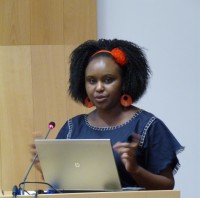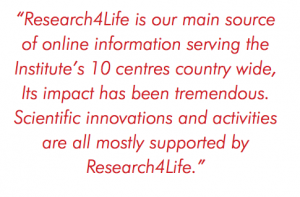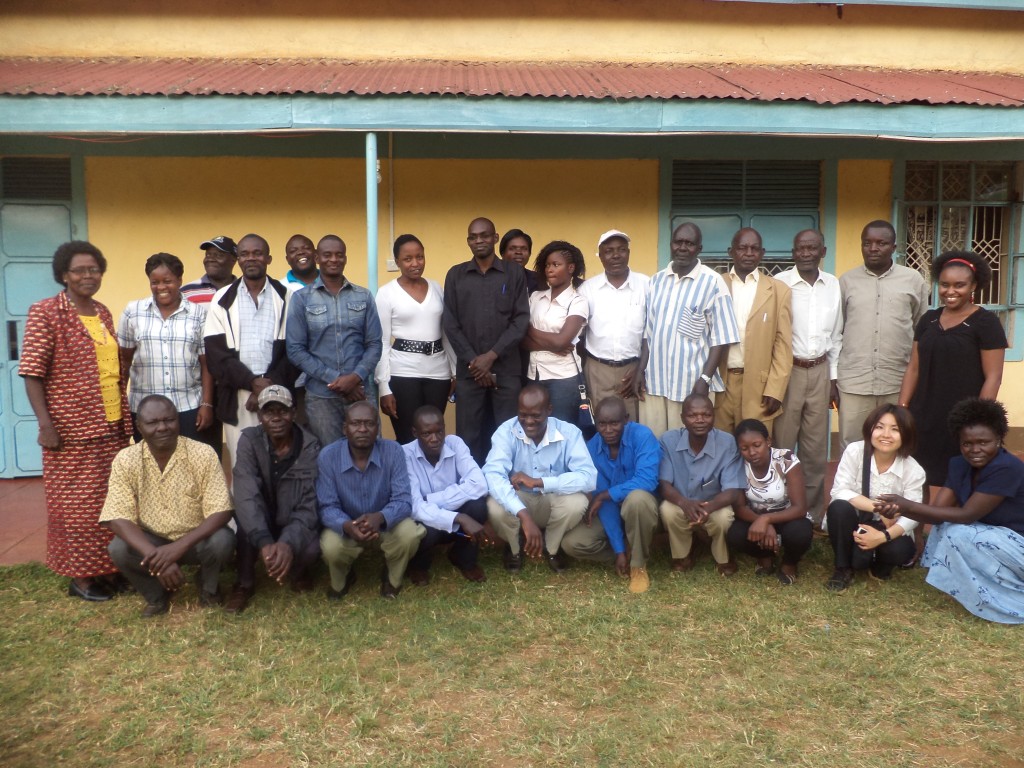A librarian by passion and profession
Cynthia Kimani embeds Research4Life training and usage across the ten campuses of the Kenyan Medical Research Institute, ramping up research output and proving the library is a digital backbone of research.
A decade ago, when Cynthia Kimani began work at the Kenya Medical Research Institute (KEMRI), librarians performed on-line literature searches for scores of scientists on a single computer, “I experienced having to carry out massive literature searches and watched the researchers facing challenges on the computers,” she said. Today, KEMRI has gained recognition as a leading health research centre in the region.

The Kenya Medical Research Institute is committed to improving quality of human life and public health through Innovative Research. KEMRI carries out specialised diagnostic services in Histology, Endoscopy, TB, HIV-P3, Hepatitis B l, and public health among others.
“All of this requires access to scientific information,” explains Cynthia, KEMRI’s Systems Librarian, “The library is the backbone of research. Without information and knowledge, you can’t reach the end point of innovation.” Several years ago, KEMRI upgraded its Internet access and outfitted its library, laboratories and offices with new computers. But long before these improvements, Cynthia recognised the importance of training scientists to do their own literature searches, “The scientists know their exact information needs,” she states.
By 2004 she had begun informally training researchers in basic Internet search concepts and the use of Research4Life resources. Cynthia created a digital library to produce an electronic catalogue. In addition, she has carried out individualised training on the Research4life programmes, including e-mail alerts and guidelines to users online. Through this initiative, the library has received support from management and the ICT department on identifying the needs for users, making the KEMRI Headquarters Library a major communication hub today, equipped with space, computers and WI-FI connectivity for users to plug in their laptops and access the Research4Llife databases available.

In 2005 Cynthia was asked to set up a digital satellite library at KEMRI’s East and Southern Africa Centre of International Parasite Control. It became evident that researchers would have to learn to conduct their own on-line literature searches. Cynthia wrote a proposal recommending intensive training sessions to teach computer basics and the use of Research4Life programmes. The support she received from directors at KEMRI’s centres marks a high point in her career.
“I personally went to a few Centre Directors and explained the need for training and why the library was involved in this initiative,” she explains, “I received a lot of support and we rolled out our first training. The most humbling experience was when the Centre Directors supported their department by attending the training.” KEMRI now mandates quarterly library-run training sessions for all departments and new graduate students. “Research4life has improved the image of the library within the Institute and especially among the scientific group,” she states. Cynthia’s initiatives extend beyond KEMRI. To spread the word about the impact Research4Life resources can have on research in all sectors, Cynthia promotes it at the Institute’s annual Scientific Workshop (KASH) that brings together scientists from across Kenya and the region. “This way I am able to create awareness,” she adds.

She trained nurses in the use of the Research4Life resources in 2009 and 2010 as a representative of the Association for Health Information and Libraries in Africa (AHILA). “The goal was to impart health information searching skills to nurses as a major function of healthcare providers,” she states.
As KEMRI’s Systems Librarian, she wants to ensure the library’s role as an electronic learning centre where researchers, students and other users can get training in all Research4Life databases. A recent example is a course organized for KEMRI’s Intellectual Property Department in the use of ARDI.
“Because KEMRI has ventured into the area of innovative research activities, access to Research for Development and Innovation will be vital,” she comments.
Passion for her profession has spurred Cynthia to continue her education. She is currently enrolled in a Masters degree programme in Information Science and plans to earn a doctoral degree. “This will enable me to grow as a librarian, especially in the teaching fraternity,” she states.
This story is part of the “Unsung Heroes: Stories from the Library”case study collection. Read more stories from Research4Life users.





